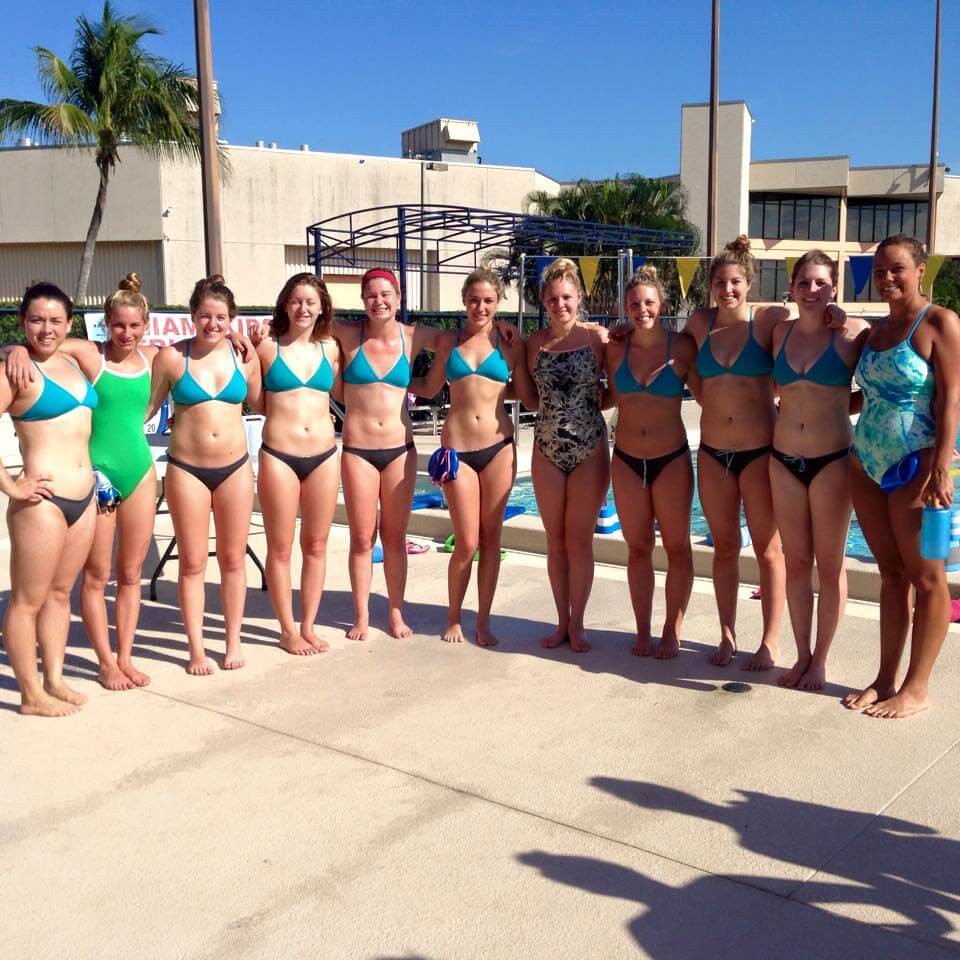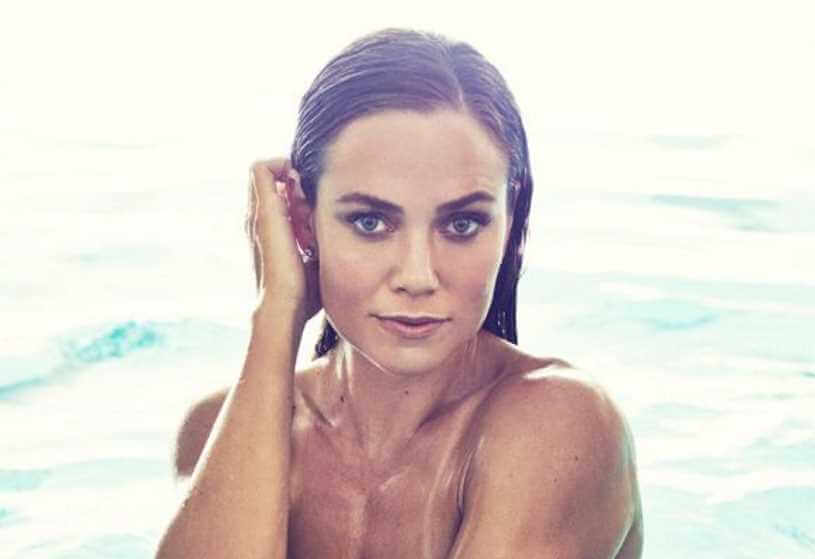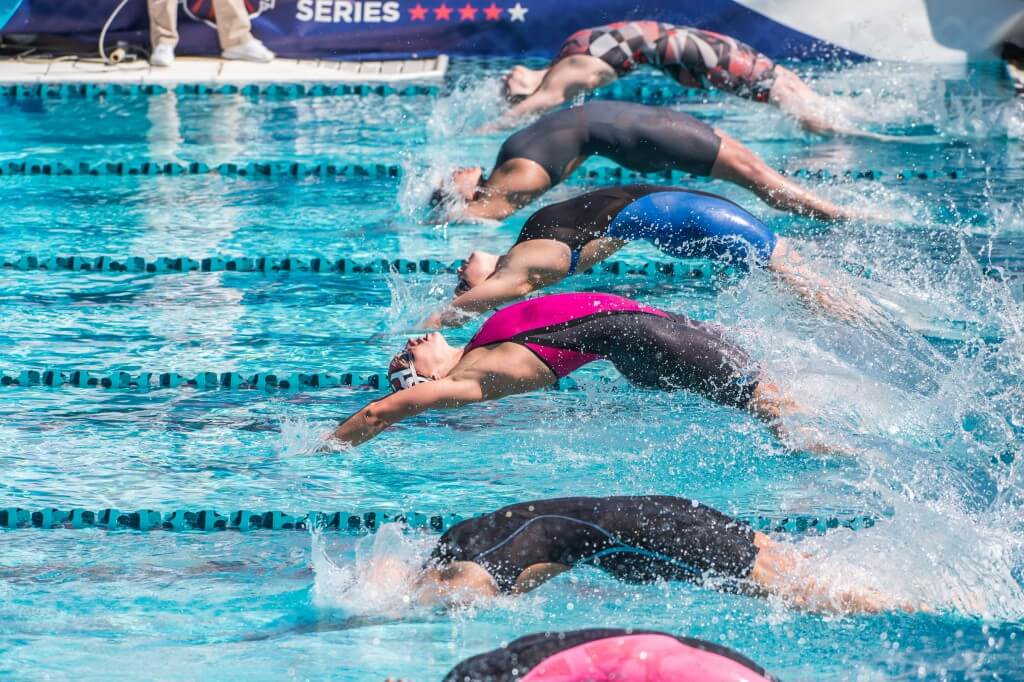Media’s Portrayal of Body Aesthetics Put Swimmers at Risk

By Courtney Bartholomew, SwimmingWorld College Intern
The other day I was beginning to write a piece for Swimming World covering taper tips. However, as I scrolled through my newsfeed on Facebook, I saw that one of my former teammates had posted an article titled “Why We Should Be Paying More Attention to Eating Disorders in Female College Athletes.” Out of curiosity, I clicked the link.
The article notes that females who are collegiate athletes are more likely to have an eating disorder than non-athlete college females. In fact, according to everydayhealth.com, athletes are three times more likely than the average person to have an eating disorder. This fact astonished me. What also shocked me is how little information there is available regarding eating disorders within the swimming and diving community. We all have heard, learned about, and know what eating disorders are and how they get out of hand, but what happens when athletes do it to get ahead in their sport, have a better personal body image, or do not even recognize they are not eating enough?
The Portrayal
Almost everyone desires to have the athletic, fit, toned body portrayed on the covers of Sports Illustrated and various other sports magazines. This desired image of being overly-thin and fit comes into contention with the actual body type an athlete might need to perform well. One quote that really stuck out to me in the article (noted above) was “Female athletes have two body images: the one that’s important for their sport, and the one society promotes.”
Each day the media endorses the body type that sells magazines and ad space. For example, “In the 2012 Summer Olympics, coverage on female athletes focused on their hair and uniforms, valuing athletes’ aesthetic beauty over athletic ability.” Not only does the media push the idea that aesthetic beauty is more important than athletic ability, it puts forth the idea that a ideal body type in society today is more important than an athletic, healthy body at peak performance.
The Messages Sent
While the media pushes the idea that aesthetic beauty and a fit body is important, so does the sport of swimming. While it is not intentional, how is a swimmer or diver not to be self-conscious at times when they are wearing a small, tight piece of fabric? Not only is the entire body displayed for the world to see, but according to Jill Castle writing for USA Swimming, on top of being self-conscious, there are also weight stressors associated with swimming. “1) The belief among swimmers and coaches that lower body weight and body fat leads to improved swimming times, 2) Weight status and fluctuation awareness from teammates, and 3) The sense that lighter swimmers have a performance advantage.”
All of these ideas combined create the perfect storm for a swimmer or diver to not only feel self-conscious, but also to feel as though in order to improve times or have a higher score in diving, one must have a leaner, more fit body. Not only do these stressors affect how individuals eat and view their body type, but also the problem is perpetuated when the issue is not addressed. If a swimmer or a diver is competing at a high level, having personal bests, and training at a consistent level; coaches, teammates, and even friends might turn a blind eye to an eating problem. This is an issue because even if an athlete is competing at a successful level, this does not mean that their eating habits are healthy.
I personally know there have been times in my collegiate swimming career when I have missed a snack or even a meal because I do not have enough time in the day to grab lunch or run home. I also will be the first to admit that there have been times in my career where I have wanted to have my body look a certain way or I have been self-conscious about how I look, and because of that, may not have eaten as much as I should have. However, most of the time a blind-eye was turned or my behavior was reinforced with comments of “Oh, you look skinny!” or “Wow, you look really toned.” What sort of message are these comments sending to swimmers and divers? Is this an idea the swimming and diving communities want to continue?
The Changes We Can Make
Collegiate athletes need to recognize that every body is different and every athlete requires an individualized plan to reach peak performance. A swimmer who is 5’9” and 150lbs requires more calories and fluids than a diver who is 5’2” and 120lbs. These individualized plans help swimmers and divers to know how much they should be eating and hydrating on a daily basis. It is important for swimmers and divers to recognize how many calories they are burning per day and how to replenish after a full day of practice.
On top of this, swimmers and divers need to understand that they need fuel throughout the day to practice well and compete at a successful level. By educating female athletes to recognize that each individual has different consumption needs due to body and activity type, swimmers and divers can begin to see that body types are also individualized and should be celebrated.
Let’s start paying attention to eating disorders in female college athletes and recognizing what the signs of an eating disorders are and how we, as a community, can endorse positive body images as much as athletic and academic success. To encourage positive body images and healthy eating habits, we should be praising athletic ability and success, not aesthetic beauty. By providing additional research and increased attention to this problem, the swimming and diving community can positively impact how the media promotes athletes.
Maybe by Rio 2016, the media will be discussing how the newest female gold medalist in an event trains and mentally prepares for a race, instead of how she looks in the newest tech suit. By promoting healthy eating habits and positive body images, the swimming and diving community can help combat eating disorders and encourage healthier athletes within the sport.







to me, swimmers have the best bodies.
Great article. Even applied to junior high and high school athletes
sammi siegal
K viejas tan bonitas ;yo también nado intencivo todo esto me gusta las felicitó adios
Aubrey Bach this is really good!
Eating disorder! Like is eating 10000 calories a day one?!
Not if that’s what you need for the kind of training you put in!
Not if that’s what you need for the type of training you do!
I was a competitive swimmer for 8 years before ending up hospitalized at 16 due to anorexia. I would love to see this issue highlighted more often!
You can’t judge a book by its cover is very true in swimming I’ve found over the years. I’ve met many seemingly overweight swimmers who were incredibly fit and able to swim circles around others with so-called “swimmers’ bodies”. It’s not how you look – it’s how fast you can swim! No more body shaming I wish – whether you’re fat, skinny or in between!
Mowgli
I never thought I could be skinny enough when I swam. Looking back I was way to tiny. At 5’2″ I was only 95lbs to 110 at my biggest. Now that I don’t competitively swim it has taken a toll on almost all of my body. And I can’t get back to that weight. No matter how hard I try. That body image issue never leaves you.
Great article…even us masters swimmers struggle with this.
Steph Boehm good read gotta say I can empathise with Thai
This is such a HUGE HUGE issue. It needs attention, care and a healthy forum. I’m EXHAUSTED with skinny girls with incredibly unhealthy eating habits who are non athletes having such a strong and powerful voice on beauty. It’s absurd. Don’t even get me started on the fashion industry as a whole. We can do so much better!
Wow. You did an amazing job hitting so many important points.
I hope that this message gets spread fast.
Great Article.
I think it needs to start with having a full training staff available. If you don’t have a nutritionist at the D1 level, you aren’t going to have them at D2 or D3. Kids don’t know how to eat right. Especially in college. And cafeteria food is disgusting. Most schools offer no nutritional information for the foods displayed. kids have no idea the number of calories they are taking in, or how many they should be taking in. Unless you are at an elite college, this information isn’t available. Nutrition should be a mainstay of swimming and diving. I have also mentioned this before, but a lot of times eating disorders are a control issue. Everything else in the student athletes life is in somebody else’s control, but food can’t be. You can’t force somebody to eat or not to eat. It can be deeper than looks. Something to consider. Is your swimmer emotionally ok? Are they struggling? Do they need somebody to talk to about life, not just swimming. The media does play a part, but so does inner confidence or lack there of. We need to build girls up from an early age, so when they get to college they have a strong sense of self, and can deal with life on life’s terms. If you look at Olympic swimmers, they are strong, solid, muscular. There are no string beans in the group. They body will start to burn muscle if there isn’t enough protein and carbohydrate to burn. Then you are damaging your chances of peak performance. You cannot perform without eating. The body will eat itself to get what it needs. Exhaustion physically will set in, then emotionally. I support open dialog in this area…from the beginning of the season to the end. Nice job Courtney! Great Article!
Broad article. Some good points. Would like to have had some examples and maybe go in depth with how you think we should go about fixing this. Just feels like everything we’ve already heard before. Still good though. 6/10
Also. Why just female swimmers and divers? Men have eating disorders also.
This is a fantastic article. I’m a male college swimmer and I find that this is a problem for me as well. Though I do agree that I may be a more prominent issue in the female athlete community that is not to say that men don’t experience the same pressures. Coaches have said to me when looking at another team “yeah see them? That’s what real athletes look like” and being a dedicated swimmer that sucks to hear and makes you rethink everything you’re doing. This is something that must be discussed more by all athletes at all levels and hopefully that can help get rid of the stigma behind eating disorders and turn the focus back to performance rather than body weight.
This is a very well written article and so very true for sports and the general public all over the world. I live in Australia and at 44 in recovery from anorexia. I have take up marathon swimming, and have had to gain a lot of weight (15 kilograms) and feel so much stronger for it. I hope this message makes it around the world to all women and girls!
Thanks for the interesting piece. I have been involved in swimming from the age of 8 and am a coach now, training whenever possible. I come from an athletic family and so we all have an athletic frame, with me being a bit bigger than the other women in my family.
For as long as I can remember I have had the same response when people hear that I was a swimmer: “Yes, I can see from your shoulders.”
I’ve had men (from my teenage years) pass comments such as ”don’t mess with her…have you seen the size of her arms and legs?”
Similarly I’ve heard the same message from many a mom, dad, aunt: “We thought she should stop swimming because we didn’t want her to develop big shoulders.”
People would remark that I wear ‘girly’ shoes when they saw me in heels. Or they were surprised that I was ‘able to make the switch’ between Sporty Me and Girly or Feminine Me. What absolute bulldust.
It took me many, many years to accept that this is my body and I should embrace it.
So yes, I have broad shoulders (boys at school would measure and compare shoulders and biceps). And yes I am muscular and athletic.
But that’s a ‘price’ I am willing to pay and accept and embrace. For the athletic ability I have been blessed with. And, as if that’s not enough, the joys, the highs and the lows, the friendships and the rewards that came with the sport of swimming and the other codes I have managed to enjoy from a young age are priceless.
I have a healthy appetite and am not active still at 42.
So thanks for the article. We need to change the perception that an athletic body is not feminine (and here I want to cite examples like Serena Williams, Maria Mutola, Martina Navratilova, who come to mind). We need to recognise the TALENT that exists and acknowledge that first and foremost.
I recall those ‘glamorous’ images of female athletes from London 2012, perpetuating the idea that there are 2 sides to a woman involved in sport. What are we teaching our young women???
I was able to resist the shallow perceptions I came across over the last 30-odd years, but others may not…
I swam against the author of this article in high school and now I’m reading one of the best swimming articles I’ve ever read from her too. This is wonderful, thank you!
Super important issue to shed light on in our sport. Way too many great female athletes have compromised their health and wellness because of these absurd standards.
Media runs with the money. Marketing, too. They reflect what we value. Appearance, Excitement and possession are today’s marketing tools. What matters rules. If we want to deceive ourselves by what our eyes see and not our heart, that is our choice. If you find media offensive, let it be known. The commercial media will not listen, they have their charts to prove to themselves that they are right. By stating your opinion you are giving the audience a nudge to stand with you.
Such a B.S. You want to be fat? Be my gest, but stop winig . All i can say is that this article is to make comftable all this fat asses and lazy women! And maby but not likely man! Looking the resolts from competitions in any sport I don’t see any elephants getting a !!!